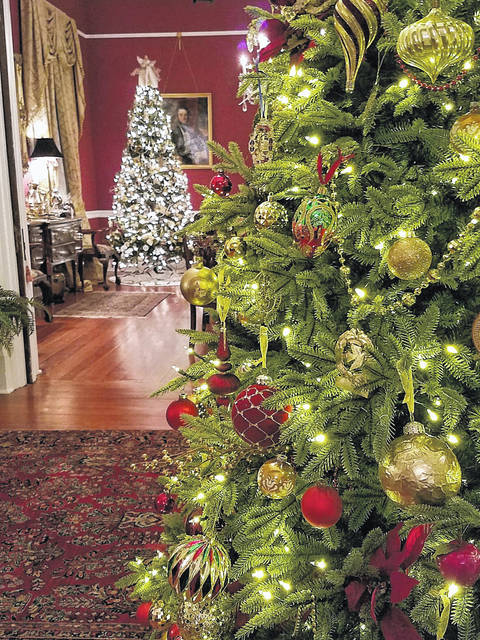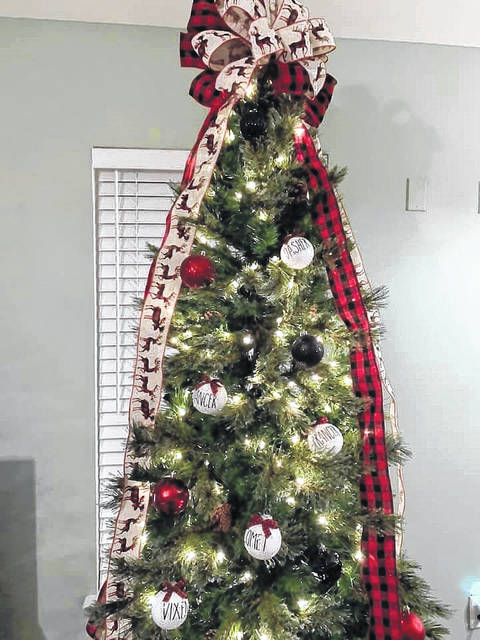
When it comes to Christmas decorations, Chief Keith Minick recommends not leaving lights on when you are not home.
Courtesy of Rose Marie Favors
NEWBERRY COUNTY — Many people around the county have already put up their decorations to get into the holiday spirit, but it is important to make sure your holiday decorations do not end up in flames.
The following are some winter holiday fire facts from the National Fire Protection Association (nfpa.org):
• Between 2014-2018, U.S. fire departments responded to an average of 160 home fires that started with Christmas trees per year. These fires caused an average of two deaths, 14 injuries, and $10 million in direct property damage annually.
• Electrical distribution or lighting equipment was involved in almost half (45%) of home Christmas tree fires.
• More than one-fifth (22%) of the Christmas tree fires, involve some type of heat source, such as a candle or equipment, was too close to the tree.
• U.S. fire departments responded to an estimated average of 770 home structure fires per year that began with decorations, excluding Christmas trees, in 2014-2018. These fires caused an annual average of two civilian fire deaths, 30 civilian fire injuries and $11 million in direct property damage.
• On average, 21 home candle fires were reported each day between 2014-2018.
• Three of every five (60%) candle fires started when something that could burn, such as furniture, mattresses or bedding, curtains, or decorations, was too close to the candle.
• Thanksgiving is the peak day for home cooking fires, followed by Christmas Day, the day before Thanksgiving, and Christmas Eve.
City of Newberry Fire Chief, Keith Minick, gave some tips and recommendations to help Newberry County residents from becoming another statistic.
In regards to lights, Minick said it is safe to leave your lights on, but a timer is recommended — which also helps with electricity consumption.
“Make sure they (lights) are plugged in properly, you don’t have excessive drop cords, making sure if you have outside lights they are not laying in water,” he said. “We don’t encourage people to have them on when they are not there, we certainly want to minimize that.”
When using surge protectors, Minick advised that they need to be plugged directly into the wall. He said they have had fire calls where people had drop cords from the outlet to the surge protector, and he said they do not recommend that.
“You don’t want to overload the surge protector, we have found where people plugged the surge protector into the wall, but then have a surge protector plugged into another one — you are overloading the circuits,” he said.
Minick said make sure your your live tree is watered and check the needles often to make sure they are not loose and falling off.
“Make sure your tree is getting properly watered for the lights you are putting on it,” he said. “If the tree gets dry, it can catch on fire.”
Minick said if a tree was to catch on fire, the gifts around it are flammable and that would add fuel to the fire. To see how bad a Christmas tree fire can get, follow this link: youtube.com/watch?v=0u5jCPHmevE.
“It is important to make sure you don’t have excessive drop cords, loose wiring or a dried out Christmas tree that could start a fire,” he said.
Minick also advises that everyone should make sure their stove is clean, as a dirty stove top or oven can catch fire. He also suggested maintaining a three-foot distance from the stove, especially with children around. He said to see more kitchen fire safety, go to www.nfpa.org/Public-Education/Staying-safe/Preparedness/Fire-Prevention-Week?.
When it comes to candles, Minick said to make sure you are aware of what is around the candle.
“That is an open flame, you don’t want it around anything combustible. You don’t want it near curtains, and make sure there is nothing above the candle (like a cabinet) that could get heat damage,” he said.
Minick also reminds residents with the colder temperatures to check their alternative heating sources — and again, don’t use multiple drop cords. He said to follow the manufacturing guidelines and put them in the proper locations, which in some cases is outside. As always, Minick reminds the public to make sure they have working smoke alarms.
Reach Andrew Wigger @ 803-768-3122 or on Twitter @TheNBOnews.

